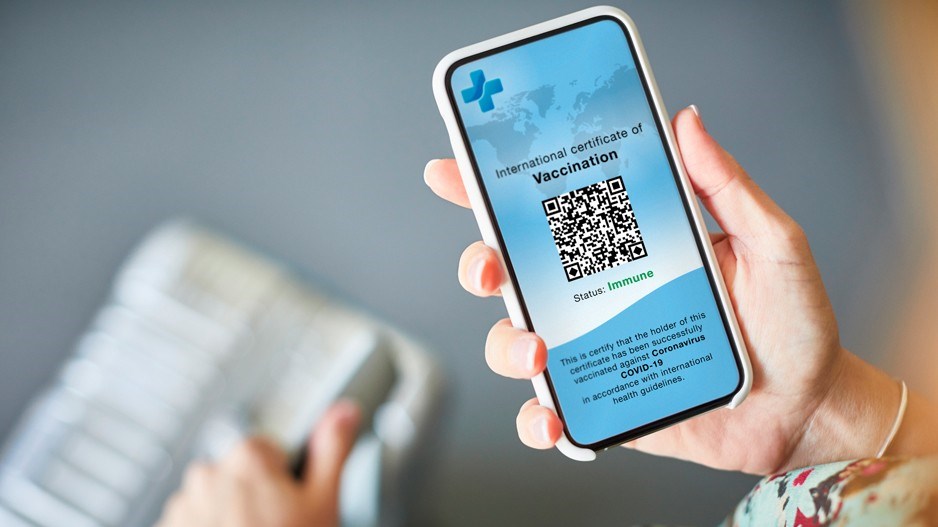A smartphone in hand showing proof of one’s vaccination status might be required the next time a British Columbian pops into a concert, sports game or movie theatre.
B.C. officials revealed Monday the province is introducing COVID-19 vaccine certificates for non-essential services amid surging cases of the Delta variant.
The B.C. Vaccine Card is set to launch September 13.
Premier John Horgan also confirmed the current spike in cases would delay the province’s plans to move into Step 4 of its four-step reopening plan, originally slated for September 7.
“There is no reason why those who are anxious to participate in the social and economic life of our community can’t take that next step and get that safe, effective vaccine,” he said.
“And when they do that, that will give them opportunities to go to nightclubs, to go to restaurants.”
British Columbians will need at least one dose of a COVID-19 vaccine by September 13 to use the B.C. Vaccine Card. By October 24, users are expected to be fully vaccinated at least seven days after getting their second dose to access businesses and events.
A link will be provided to British Columbians with their proof of vaccination ahead of the September 13 launch of the certificates that people can save onto their phones to show businesses. Those unable to show proof of vaccination online will be given “a secure alternative option,” according to a government release.
Horgan, meanwhile, said his government was working with the Privacy Commissioner, the Ministry of Health and the Office of the Public Health Officer to ensure the data was kept secure.
“We’re confident that every tool we can use to protect this information and to make sure it can’t be duplicated or forged will be put in place and we’ll see how we unroll it on the 13th [of September] and can be judged at that time,” he said.
B.C. provincial health office Dr. Bonnie Henry described the certificates as a “time-limited initiative.”
“As we move into the fall, we’ll continue to work with the federal government to make sure we have an alignment with the federal … vaccine passport that’s under development as well.”
She said all details about the program would be released by September 7.
The program is tentatively scheduled to end January 31, 2022, but could be extended beyond that.
The B.C. Vaccine Card will need to be displayed for entering nightclubs, casinos, fitness centres, weddings, indoor conferences, liquor stores and choirs, among a host of other locations and events.
It does not apply to retailers, grocery stores, health services, places of worship or K-12 schools (a briefing is tentatively scheduled for Tuesday about COVID-19 safety measures for K-12 students).
Henry said she expects “there may be a small group of people who are protesting against this” vaccination certificate.
“But, as it is a provincial health officer order, we do have the ability to support businesses with bylaw officers,” she added.
As of Friday, 74.7% of B.C.'s total population has had at least one dose of vaccine, and 66.9% of the province's total population has had two doses.
B.C. is the second province to unveil plans to deploy such domestic vaccine certificates after Quebec did so in early August.
Ottawa, meanwhile, revealed earlier this month it was partnering with the provinces on deploying a vaccine passport suitable for international travellers for the fall.
Health care and related data pertaining to Canadians fall under the domain of the provinces, which is why the federal government must partner with provincial counterparts on developing the international vaccine passport app.
Ottawa said at the time of its announcement that it was leaving the door open to provinces to tap the technology for their own domestic vaccine certificates.
The federal government’s digital passport will include users’ COVID-19 vaccination record, the type of vaccine they received (such as Pfizer Inc. or Moderna Inc.), and the dates and locations the vaccine shots were administered.
“It is a potential overreach, but it depends on how your system is built,” said Tony Anscombe, chief security evangelist for global security software firm ESET LLC, referring to the Canadian app’s record of vaccination dates and types of vaccines administered.
He spoke to BIV prior to the province’s unveiling of the vaccine certificate.
“I don’t see a reason why a business needs to be storing that information. Unless of course, it’s for something like contact tracing or it’s an airline where potentially you need to have a record,” Anscombe added.
Those visiting B.C. from outside the province will need to show proof of vaccination based on records from their residing jurisdiction as well as government ID.
While the province is introducing domestic vaccine passports, a mask mandate is not on the table at the moment. Henry said such an option would be added “in our discussions in the next few days.”
The announcement of the vaccine certificate roll-out comes days after the province expanded restrictions in the Central Okanagan local health region — including the closure of bars and nightclubs, and reduced capacity for indoor gatherings — to the rest of the Interior Health region.
Meanwhile, Horgan said he’s consulted with Quebec Premier François Legault on the latter’s own rollout of a vaccine certificate.
Quebec’s vaccine certificate, set to launch September 1, will be needed to get into indoor spaces such as gyms and restaurants.
Businesses would scan a QR code on a user’s phone to simply confirm whether or not someone has been vaccinated, rather than displaying all the information the federal government’s digital passport for international travellers will contain.
—With a file from Glen Korstrom




